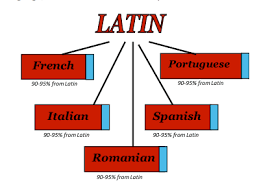Italy was unified far later, in the 19th century. “Italian” was thus created by the pen, not the sword. The 13th- and 14thcentury works of Dante, Petrarch and Boccaccio were the peninsula’s most revered literature. So when, in the 16th century, Pietro Bembo sat down to write a grammar for the prestige language of their texts, he used their (by now rather old) Tuscan dialect as his model. In this way “Italian” was born—though Bembo titled his book simply “Writings on the Vulgar Tongue”. It soon spread to elites in other regions.
意大利很晚才在19世紀統一。因此,“意大利語”是由筆而不是劍創造的。13、14世紀但丁、彼特拉克和薄伽丘的作品是半島上最受尊敬的文學作品。因此,16世紀,當皮埃特羅·本博坐下來為他們的經典語言編寫語法時,使用了他們的托斯卡納方言(到目前為止相當古老)作為模型。就這樣,“意大利語”誕生了——盡管本博把他的書簡單地命名為“俗語的寫作”。它很快就傳播到了其他地區的精英階層。

Even then, ordinary folk continued speaking their own dialects, which, across great enough distances—say from Milan to Naples—were and remain mutually incomprehensible. These are not bad copies of Italian but its siblings, descendants of Latin in their own right. Over half of Italians proudly speak one of them still (though nearly all speak Italian, too). A Sicilian who doesn’t speak Sicilian is hardly worthy of the name; Neapolitan plays a crucial role in the celebrated novels of Elena Ferrante.
即使在那個時候,普通百姓仍然在講他們自己的方言,這些方言跨越了足夠遠的距離,比如從米蘭到納普勒斯,彼此之間仍然無法理解。這些并非意大利語失敗的復制品,而是其兄弟姐妹,拉丁語的后裔。超過一半的意大利人仍然自豪地說其中一種語言(盡管幾乎所有人也都說意大利語)。一個不會說西西里語的西西里人很難稱得上是西西里人; 那不勒斯人在埃琳娜·費朗特的著名小說中起著至關重要的作用。
These days, amid migration and globalisation, Italian continues to develop. Naturally some worry that it is happening too fast; that young people are derelict in their grammar, or use too many foreign words. In reality, the same forces that made Latin from its predecessor (called Proto Indo-European), and turned Latin into Italian—the drift of time and exposure to different influences— are still operating. The only unchanging language is an unspoken one. Classical Latin may be dead—but as Italian, it lives on. Long live dismal Latin!
如今,在移民和全球化的背景下,意大利繼續發展。自然有人擔心這一切發生得太快;年輕人在語法上荒廢了,還使用了太多的外來詞。事實上,時間累積和受到的不同影響使拉丁語從前身原始印歐語變為拉丁語,而同樣力量也把拉丁語變成意大利語,如今這種力量仍然在發揮作用。只要語言在使用就會一直發生改變。古典拉丁語可能已經絕跡,但作為意大利語,它仍然存在。沒落的拉丁語萬歲!
譯文由可可原創,僅供學習交流使用,未經許可請勿轉載。












